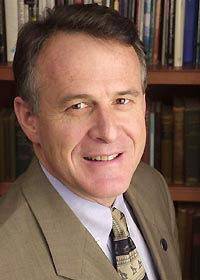|
This is an archived
article. For the latest news, go to the Advance Homepage
For more archives, go to the Advance Archive/Search Page. |
||
New task forces will explore ways to improve the processes and procedures that support research. I have on numerous occasions made known to the University community that research is a top priority. In fact, I first spoke in depth to that point in this very column about a year ago (Advance, Dec. 11, 2000). The centrality of research to the mission and goals of this University is a given. What is not a given, and what must be addressed, is the methodology by which research at UConn can be most effectively and efficiently conducted toward better educating our students and making better our society.
Earlier this year, I sought an outside perspective and asked George Dambach, vice president for research and dean of the graduate school at Wayne State University, to review the University's research activities and provide an external view of the research enterprise from leadership, organizational, and administrative perspectives. I sought recommendations that can lead to enhancement of research. Specifically, I asked for ways to improve the institutiona l processes and procedures that enable and support research. The report has now been received and shared with the president and vice presidents, the chancellor's staff, and the deans. It makes specific recommendations in six areas: research administration , the research budget process, institutional cost sharing, technology transfer operations, institutional investment in research, and research leadership. Initial responses to the Dambach report are very positive. As a result, the vice provost for research, Ian Hart, and I are establishing three task forces to analyze the report in detail and work toward solving the problems enumerated in it. These are: the Chancellor's Research Policy Committee; the Chancellor's Committee on Specialized Service Facilities; and the Cost Accounting Committee. The report has reinforced many of the concerns I already hold about our research enterprise. Our limited research resources are too thinly spread. The amount of research dollars we receive from all sources has been fairly flat. My goal is to increase the total by 10 percent a year. A good portion of the increase should come from the support we receive from the federal government. We talk often and profoundly about what we want our research enterprise to be, but our actions are sometimes not consistent with our words. We hire faculty with tenure homes in departments, but the deans or department heads have little ability to make an impact on the generation of research grants, since research monies (indirect costs) don't go to them. We must devise a way in which the deans, department heads, and research institute directors can generate funds, and the central administration must have ways to fiscally impact the progress of research. In any university, there are a limited number of programs (science, engineering, agriculture, etc.) that generate the majority of funded research. While it is prudent to invest research resources into programs that can generate additional funds, strategic investment in the fine arts, social sciences and humanities is critical to build a high quality university. With a judicious allocation of all our research resources, we can make a major research impact. We need a business plan to achieve this, but we must also use money in a discretionary fashion to promote excellence across the board. Our problem is that we haven't put money in the hands of the individuals who make decisions; nor do we necessarily have the ability to put money where we need it academically or for research purposes. The task forces will look at how we do the business of research, at how we achieve consistency so all are on a level playing field. We must make our programs consistent, so they offer an incentive to faculty without reducing our investment in the overall research enterprise. In the budget for fiscal year 2003, I will invest at least $6 million of indirect cost returns in the research budget. Among these significant and strategic investments will be the Center for Regenerative Biology (which studies the cellular and molecular mechanisms, fertilization, early embryonic development and cell differentiation in mammals through genetic manipulation techniques and "therapeutic cloning'), fuel cell research (fuel cells are one of the most promising energy alternatives for automotive propulsion and residential and portable power applications), and comparative human rights (a program involving the study of human rights issues around the world, anchored by the historical experiences in South Africa, and promoting national and international exchange of ideas and strategies to foster a culture of human rights). Later, I intend to invest in a comprehensive program in the marine sciences and to seek input from research faculty on mechanisms to determine other appropriate areas for the university to invest resources. By marshaling our investment strategy, we can look forward constructively to building those solid, academically sound research programs that are critical to our raising the University of Connecticut's national visibility as a prominent research university. Members of the three new task forces are:
Chancellor's Research Policy
Committee
Chancellor's Committee on Specialized
Service Facilities
Cost Accounting Committee |

